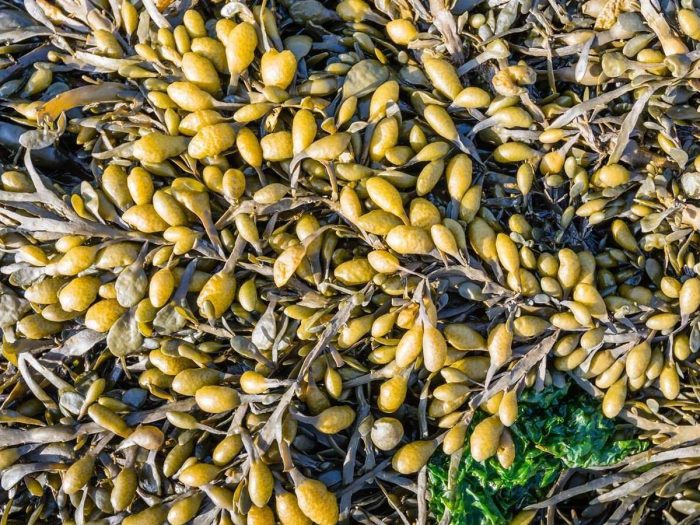Organic Bladderwrack Powder
Regular price
$16.99
Sale
What is Bladderwrack?
Although this has a bit of an odd name, bladderwrack is actually one of the most common types of seaweed found in the oceans. Around the British Isles, Europe, the Baltic Sea, and even the eastern coast of North America, this kelp variety has the scientific name Fucus vesiculosus. Some of the other names of bladderwrack include rockweed, red fucus, and black tang, depending on where in the world you happen to be. This type of seaweed prefers shelters inlets without too much movement or current and is found in huge numbers in certain areas. The plant is highly identifiable by the small paired air sacs found along the midrib branches.
This has been an herbal remedy and a culinary element in various cultures for centuries. In fact, bladderwrack was the original source of iodine, which was hugely important in treating various conditions, and is also an important part of a nutritional diet. You can use bladderwrack most commonly as an herbal supplement or powder, which can be consumed directly or mixed into water or facial scrubs to improve its efficacy. While this has been used in alternative treatments for hundreds of years, it is only becoming well-known to the general public recently, so the demand for this herb is definitely rising. The high levels of mucilage, beta-carotene, iodine, potassium, zeaxanthin, and other organic compounds give this herb so much power!

Health Benefits of Bladderwrack
Let’s take a closer look at some of the health benefits of bladderwrack.
Thyroid Improvement
As mentioned above, bladderwrack was the original source of iodine back in the 19th century. Iodine is an important modulator of our thyroid gland and can ensure that our hormonal and metabolic activities are under control. [3] Therefore, as a powerful source of iodine, bladderwrack has become associated with treating many types of thyroid disorders. Primarily, bladderwrack stimulates the thyroid gland to increase hormonal output.
One of the other effects of bladderwrack is a heightened metabolism, which makes it easier to lose weight, as your body is working right along with you. Bladderwrack has been praised as a weight loss tool for generations and many people are starting to realize how beneficial it can be. When your body is working at a high level and burning off more fat, you also suppress the appetite, thereby preventing obesity and the other related health issues that come along with it.
Vision Health
The high levels of beta-carotene found in bladderwrack make it an ideal solution for someone trying to improve their vision. Beta-carotene is an antioxidant that directly neutralized free radicals in the eyes and cornea. Essentially, bladderwrack can help slow down macular degeneration and prevent the development of cataracts.
Reduced Inflammation
One of the other popular uses of bladderwrack over the years has been as an anti-inflammatory substance. Whether you are suffering from gout, arthritis, hemorrhoids, or skin irritation, bladderwrack can successfully neutralize the irritation, reduce swelling, and even relieve pain. The internal and external (topical) uses of bladderwrack are both useful approaches and are even better in conjunction, such as for sore muscles and joints.
Anticancer Potential
Fucoidan is a unique type of fiber that is found in high quantities within bladderwrack. Research suggests that studies fucoidan has many beneficial properties that include antiviral, antitumor, anticoagulant, antiangiogenic, and antiarthritic properties.
Improved Digestion
There are a number of different types of fiber found in bladderwrack, but one particularly important one is alginic acid, which relieves constipation and adds bulk to the bowels, promoting a smooth digestive process that is efficient in terms of nutrient uptake. Furthermore, this helps to relieve excess flatulence, bloating, cramping, and more serious conditions like gastric ulcers and colon cancer.
*These statements have not been evaluated by the food and drug administration (FDA). These products are not intended to diagnose, treat, cure or prevent any disease.



